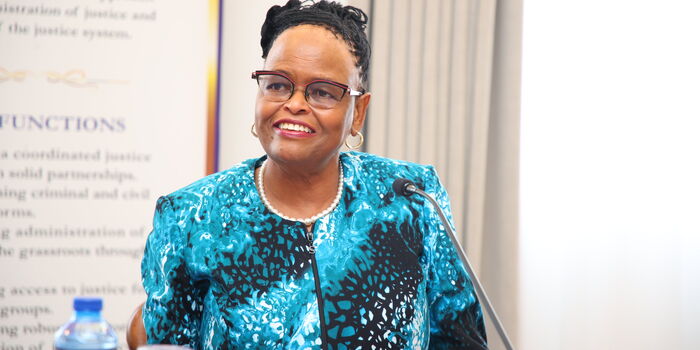Chief Justice Martha Koome has outlined five guidelines that the National Council on the Administration of Justice (NCAJ) will be undertaking in the fight against corruption in the Judiciary.
Speaking during a press conference on Tuesday, CJ Koome revealed that the council had committed to adhering to the five practices as they continue to structure a framework to curb corruption, which will be launched in March this year.
“Remaining very optimistic and reaffirming our resolve to be corrective and collaborative in the fight against corruption and economic crimes, we as NCAJ hereby reaffirm the following,” Koome stated.
“One, we will strengthen coordination because none of us can succeed alone in the fight against corruption, so we will collaborate and build capacity in the fight against corruption.”
Chief Justice Martha Koome delivers an address during the swearing-in of various independent commission office holders in Nairobi on January 20, 2025.
Photo
Judiciary
The second affirmation Koome revealed was improving legal, policy, and administrative environments. This, she said, was due to existing administrative impediments, such as the duplication of offences and laws.
She added that the council would enhance efficiency and accountability in the fight against corruption.
NCAJ’s fourth commitment was to deepen digital innovation, as the use of this technology reduced human interaction, which significantly lowered the chances of corruption.
“And number five, entrench sustainability safeguards and mechanisms to support the fight against corruption,” Koome concluded.
Speaking in her capacity as the NCAJ chairperson, Koome also revealed that the council was in the final stages of developing a guiding framework to regulate judicial administrators and combat corruption.
“We have painstakingly developed a draft anti-corruption strategic guiding framework, which we are finalising here and which we are going to launch in March. This is the framework that is guiding every one of us on how to effectively address the issues of corruption in all its facets,” she stated.
Koome’s remarks come on the heels of months of condemnation of the Judicial Service Commission (JSC), especially the Supreme Court of Kenya, for rampant corruption.
Senior lawyers in the country, including former Law Society of Kenya (LSK) President Nelson Havi and Ahmednasir Abdullahi, have even taken the matter to court, petitioning for the removal of Koome and the other six Supreme Court judges from office.
From left to right: Justice Isaac Lenaola, Justice William Ouko, Deputy Chief Justice Philomena Mwilu, Chief Justice Martha Koome, Justice Mohamed Ibrahim, Justice Njoki Ndung’u and Justice Smokin Wanjala.
Photo
Judiciary Kenya


